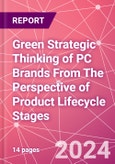This product will be delivered within 3-5 business days.
Table of Contents
Companies Mentioned (Partial List)
A selection of companies mentioned in this report includes, but is not limited to:
- Acer
- Apple
- ASUS
- Butler-MacDonald
- Chakr Innovation
- Compal
- Daisy
- Dell
- Goodwill
- Homeboy Industries
- HP
- Lavergne
- Lenovo
- Lonely Whale
- PDR
- Quanta
- SABIC
- Sims Lifecycle Services
- Sony
- Taz
- Wistron
Methodology
Primary research with a holistic, cross-domain approach
The exhaustive primary research methods are central to the value that the analyst delivers. A combination of questionnaires and on-site visits to the major manufacturers provides a first view of the latest data and trends. Information is subsequently validated by interviews with the manufacturers' suppliers and customers, covering a holistic industry value chain. This process is backed up by a cross-domain team-based approach, creating an interlaced network across numerous interrelated components and system-level devices to ensure statistical integrity and provide in-depth insight.
Complementing primary research is a running database and secondary research of industry and market information. Dedicated research into the macro-environmental trends shaping the ICT industry also allows the analyst to forecast future development trends and generate foresight perspectives. With more than 20 years of experience and endeavors in research, the methods and methodologies include:
Method
- Component supplier interviews
- System supplier interviews
- User interviews
- Channel interviews
- IPO interviews
- Focus groups
- Consumer surveys
- Production databases
- Financial data
- Custom databases
Methodology
- Technology forecasting and assessment
- Product assessment and selection
- Product life cycles
- Added value analysis
- Market trends
- Scenario analysis
- Competitor analysis

LOADING...








